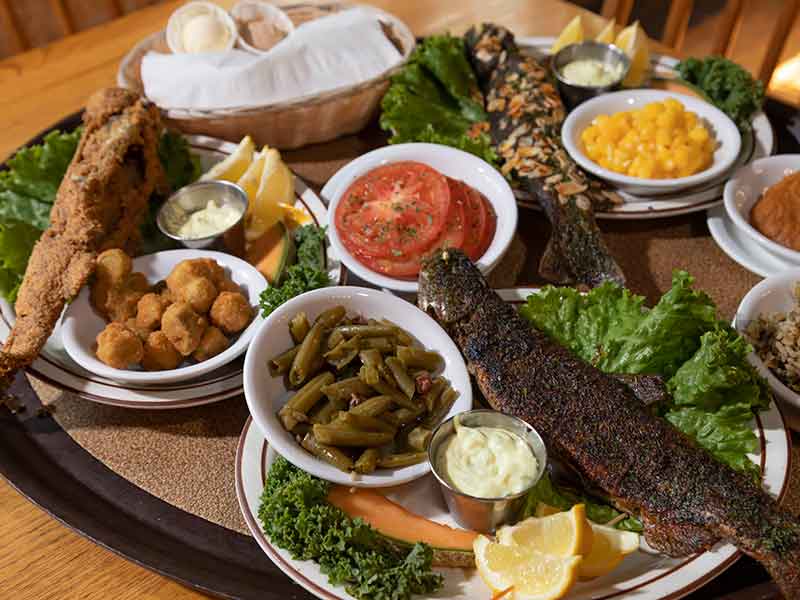Matt Crossman takes us along for the adventure when he and his buddies go trout fishing at Montauk State Park. The river is cold and there are a few mishaps, but the reward is a delicious fish dinner around the campfire at the end of the day.
I planned to leave Montauk State Park at 4 PM, but my fishing early that afternoon had only landed a specimen so small it challenged my previously steadfast and unassailable belief that every fish counts, no matter how small. It should be bigger than my thumb, right?
I needed to catch one more good fish out of the Current River. I bumped my departure time back to 5 PM, then 5:30, and finally at 5:45, I told my friend, Aaron, “I’m either catching another fish or getting out of the water at 6 PM.” And I meant it. Mostly.
To supercharge my luck, I put a different jig on. I cast it, reeled it back in, cast it again, and the jig was gone. What the …? All weekend I had knot issues; I lost six fish on Friday because the line snapped at the knot. I’m sure there was something faulty with the line and it wasn’t my fault at all. With Saturday’s first bad knot, I hadn’t even gotten the pleasure of getting a fish on the hook.
I tied on another jig, this time being extra careful. Pffft! The same thing happened again. I gave it one last try. As I threw my line in the water at 5:59 in the hope of leaving on a high note, I wondered: Are the fishing gods cursing me … or setting me up for a big win?
Located near Salem in south-central Missouri, Montauk State Park is one of three state-owned trout parks in the Show-Me State. The others are Bennett Spring near Lebanon and Roaring River in Cassville. A fourth, Maramec Spring Park near St. James, is privately owned by the James Foundation.
The parks are designed to give anglers the experience of trout fishing in the west without having to go there, says Kaylyn Dalbom, the Montauk park superintendent. “We can do trout fishing here in our clear, spring-fed rivers in the Ozarks,” she says.
To make that possible, every night, the Missouri Department of Conservation releases a number of trout commensurate to the number of passes sold. The release guarantees there will be plenty of fish to catch. It does not guarantee that the person holding the pole will be able to catch one (or that he can tie sufficiently strong knots). My friends Nathan and Aaron Blough, who are identical twins, organize multiple trips to Montauk every year. I cut out of work early on a Thursday, packed up my car, and began the drive from suburban St. Louis to the park.
That’s a lot of people breaking the rules. You’d think they’d at least find spots that aren’t right out in public for all to see.
Shortly after I pulled onto I-44, an SUV pulling a trailer passed me. The trailer overflowed with camping gear, as if whoever was driving it was going on a long, long, long trip. Hmmm, I wonder if that’s one of our fishing crew? A few seconds later, Nathan called me to ask if that was me he just passed.
I was eager to join Nathan and Aaron on one of the Montauk outings because “eat a fish I caught that day” has been atop my adventure bucket list for years. Given that many fish are released into the river every day, I was reasonably confident I would catch something worth eating.
Preferably many somethings. I arrived mid-afternoon, an unseasonably cold day for March 31. I set up my tent and drove to the river. I walked to the water, and as I neared the tree line, a flash of white overhead caught my eye. A bald eagle, carrying either a very large worm, a very small snake, or a stick, flew along the river in the same direction as it flowed.
In some Native American cultures, bald eagles are revered as carrying spiritual weight because they fly the highest in the sky and closest to heaven. To be given an eagle’s feather is to receive a kingly gift. I considered my sighting as a pre-fishing blessing. Would it portend a big haul of fish? I hoped so.
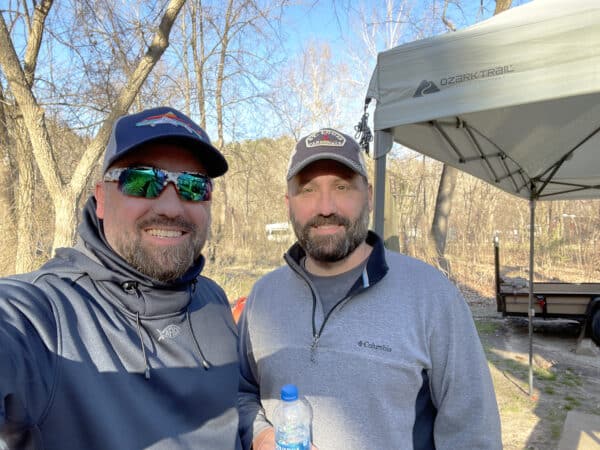
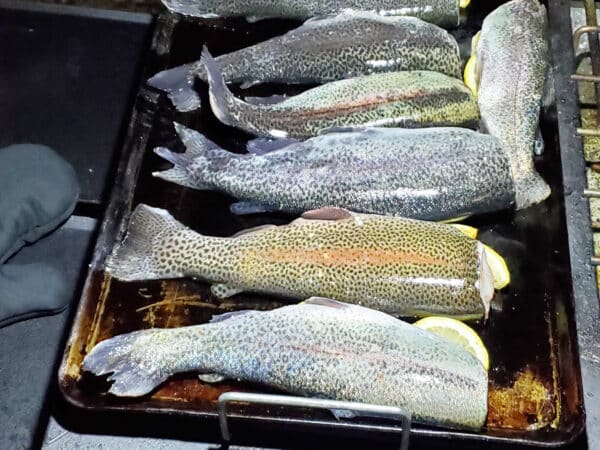
Top, identical twins Nathan and Aaron Blough organize several fishing trips to Montauk State Park each year. Above, the day’s catch is lined up on the grill and are destined to become dinner for a group of hungry fishermen.
I was alone, and the water ran higher and faster than I wanted to wade into. I kept close to shore because of that and also because dark clouds threatened bad weather, and I wanted to be able to get out quickly if I had to. The shortleaf pine, sycamore, silver maples, and white oak that lined the shore shook under the wind that blew the rain toward me.
Soon enough the rain turned to sleet turned to tiny balls of ice pinging off of me and making the ground and even the water look like they were covered in lint. We had postponed this trip a few weeks earlier because the forecast of the original date called for temperatures in the single digits and several inches of snow. Usually, my joke is that the way to end a drought is for me to plan a camping trip. I guess I’ll have to consider myself a solution to heat waves, too. The point: The only guarantee about the weather in Missouri is that you will have some.
The little balls of ice didn’t fall for long. I pulled in one fish, breathed a sigh of relief that I wasn’t going to get skunked, and headed to our campsite to warm up by the fire with my friends.
As I stirred to life in my tent the next morning, I listened to the birds’ call and response and tried to discern where each one came from. The loudest sat in a tree above me. My ears told me another came from forward and to the left, and another back and to the right. I thought I heard two distinct calls, meaning two types of birds, but I’m no expert. I wondered if they were talking long-distance to each other or if I was overhearing multiple conversations. I felt like a waiter in a restaurant eavesdropping on every conversation in the place.
I dreaded wiggling out of my sleeping bag because it was warm, and the air was cold. Finally, I needed coffee more than I needed to stay warm, so I climbed out of my tent, made a cup, and took a walk.
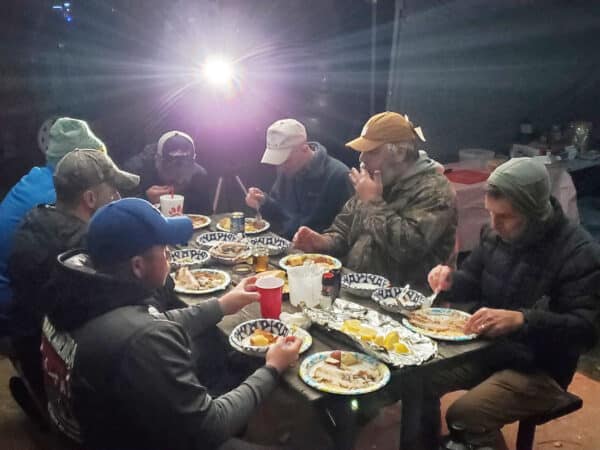
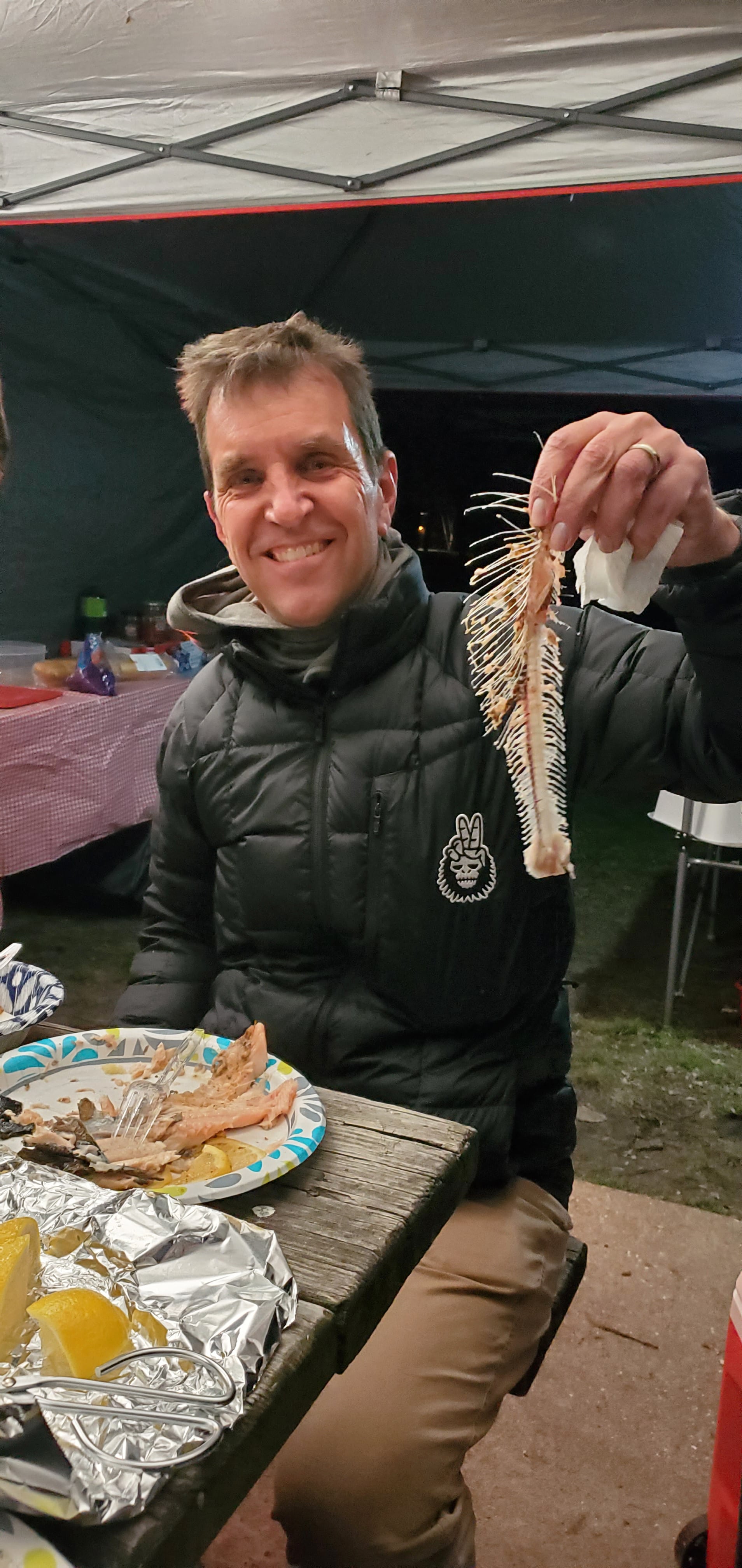
Top, the fishing buddies enjoy a trout feast and embellish a few fish stories. Above, writer Matt Crossman shows off the skeletal remains of his catch. “After years of wanting to do this, I was not going to leave one bite uneaten,” he says.
To pull trout out of the Current River in Montauk State Park, you must buy a $4 daily pass at the campground store. My walk there each morning took me over a bridge that spanned the river. As I crossed it one morning, I looked down to my left. Nine people stood waist-deep in the water, clutching their fishing poles.
Park rules say you’re not allowed to fish until 7 AM. I checked my watch: 6:57 AM. I thought That’s a lot of people breaking the rules. You’d think they’d at least find spots that aren’t right out in public for all to see. Then I noticed none of them moved. They weren’t actually fishing. They all just stood there, waiting. The only thing more obsessive than wading into a river at 6:57 AM and fishing is wading into a river at 6:57 AM and not fishing.
Not that I have room to talk, because I stopped to watch them not fish. I pulled out my notebook, jotted down a few observations, looked up, and noticed the people not fishing were watching me take notes about them, not fishing. A woman checked her watch. I checked mine. It said 7:00. So did hers, I assume, but still, she did not cast. Instead, she waited for the siren that announces the opening and closing of the fishing day.
When the siren started—FINALLY—her line was in the water less than a second later. A man to her left landed a fish while the siren was still going. Later, I described that scene to Kaylyn. “It doesn’t surprise me at all,” she said. “There are people that have been coming here for upward of 50, 70 years. There are a lot of avid trout fishermen in Missouri.”A few days after I got home, I heard the monthly testing of the tornado siren and felt the urge to go fishing.
Among our group of nine anglers, Steve is the chef. It’s his job to turn what we catch into dinner. He’s a talented and passionate angler, too.
Late Friday morning, he pulled a fish out of the river and a separate hook dug into his thumb. Every time the fish wiggled, the hook dug deeper until eventually, it was past the barb. It was funny, in the way men find excruciating but non-life-threatening pain inflicted upon other men funny.
News of his pain traveled up and down the river like we were playing a game of telephone. He tried and tried to get it out, but it wouldn’t budge. He could not cause himself the pain necessary to free it. Finally, Nathan yanked it out for him, and I hope I never feel pain like what I saw on Steve’s face.
Once the hook was out, Nathan reached into one of his many pockets, pulled out Super Glue, and using a stick as an applicator, rubbed some on the wound to close it. River Doctor! Steve kept fishing. I love that Nathan had Super Glue on his person, just in case. Maybe that’s why his trailer looked so full—he brought everything. He told me later: “I’d been wanting to remove a hook from someone’s finger like that for a long time. I was hoping it would be Steve.”
A few hours later, Steve served me the monster of a rainbow trout I had caught shortly after his mid-river surgery. It was lemony and salty and perfect and surrounded by grilled veggies and a baked potato. I don’t want to say that being in the outdoors makes me gluttonous, but I ate the whole thing, which matters only when you know this: My family got four servings out of a smaller fish when I cooked it at home.
After I had my stretch of the river to myself on Thursday, the crowd grew on Friday and swelled again on Saturday. As men, women, and children filled the river, I felt like the new kid at school. All around me, up and down the river, everyone moved back and forth with practiced familiarity, as if they knew where every class was, and I couldn’t even find the bathroom.
I took pains not to cut in front of anybody or steal their spot. After a few hours of trying not to annoy anybody, I realized I was overreacting. It was serious, but not that serious. Even strangers welcomed my questions. If I wanted to know what the fish were biting, all I had to do was ask the guy near me who was catching the most.
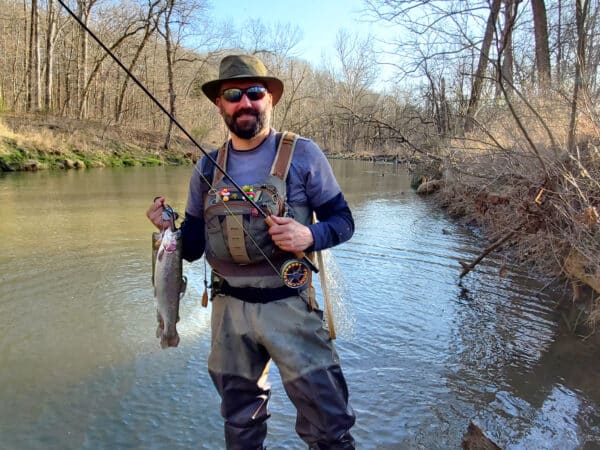
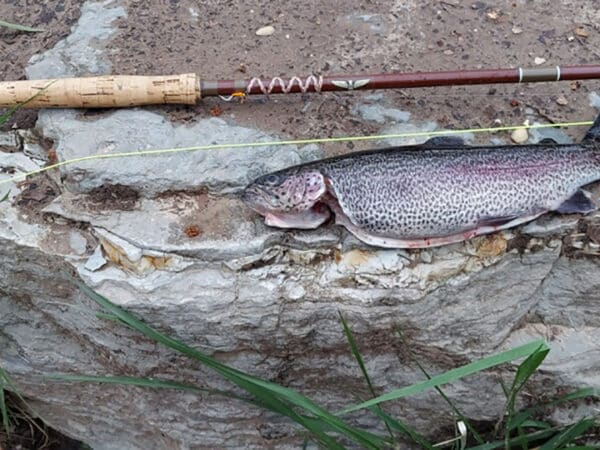
Eventually, I figured out two things: 1. I wasn’t the only Montauk newbie. 2. Montauk regulars (mostly) love (or at least tolerate) newbies the way readers love sharing their favorite authors or music fans love sharing their favorite bands.
“You have your novice fishermen, to your kids starting out fishing, to your old timers who have been fishing here for 50 years, and it’s their Mecca they return to every year,” Kaylyn says. Just as my friends visit the park frequently, so do numerous other groups. Kaylyn, who lives at the campground, has become friends with customers as well as with the campground hosts. It’s like a neighborhood that forms, unforms, and reforms year after year. “You can have a social engagement every night of the week and never leave the park,” she says.
News of his pain traveled up and down the river like we were playing a game of telephone. He tried and tried to get the hook out, but it wouldn’t budge!
Back to my last-ditch effort. As carefully as I could, I tied on a green marabou jig, upon which, for the record, I had caught nothing all weekend. I had time for another cast or two because I was really, truly going to leave at 6, I mean probably I was … or maybe 6:15.
I cast it to my left, where it plopped in the water at the equivalent of 9 on a clock face. As it drifted to about 11, I heard a noise to my left, where Aaron was. Montauk allows you to keep four fish per day. He had been stuck on three for hours in pursuit of one more good one. His pole bent under the weight of the fish on his line. “I think I have my final keeper,” he said.
Those words were no sooner out of his mouth than my “strike indicator”— fancy term for bobber— dove under the surface. I knew by the tension it was another big one … the type that had broken so many lines already.
Don’t break.
Don’t break.
Don’t break.
My line didn’t break, and a few minutes later, I plopped a beautiful rainbow trout into my net. Was it really the biggest fish caught by our crew that weekend? That’s my fish story, and I’m sticking to it.
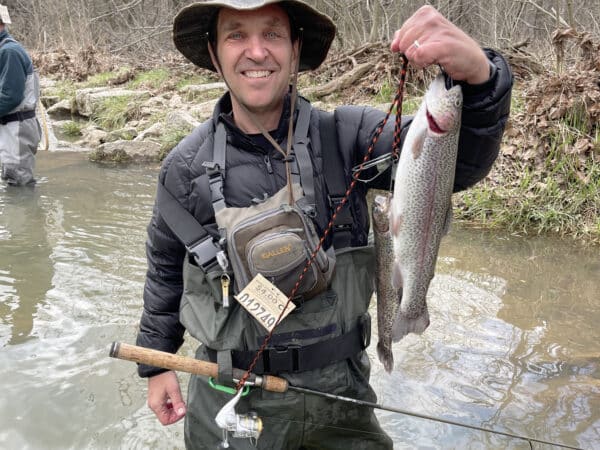
Matt Crossman proudly shows off the trout that will be the guest of honor at dinner later that evening.
Related Posts
Hot Air Balloon Adventure
On December 31, 1997, Steve Fossett took off in a hot air balloon from Busch Stadium on this day. The trip ended a few days later in Russia, establishing a new distance record.
Fuel Your Adventure
Tori Eaton shares how to prepare for your next adventure.
Catch Your Own Trout at the Dining Lodge at Bennett Spring State Park
Put your fishing skills to the test at the lodge at Bennet Spring State Park, which adds an element of DIY to fresh trout.



